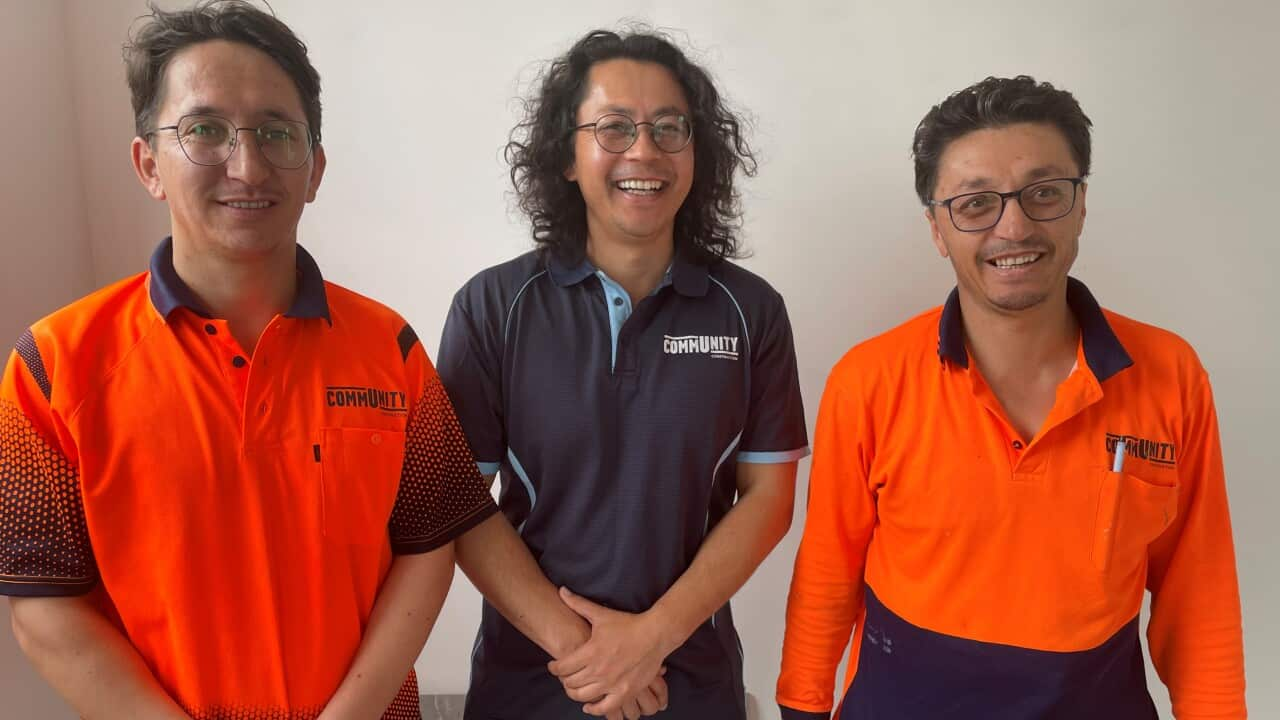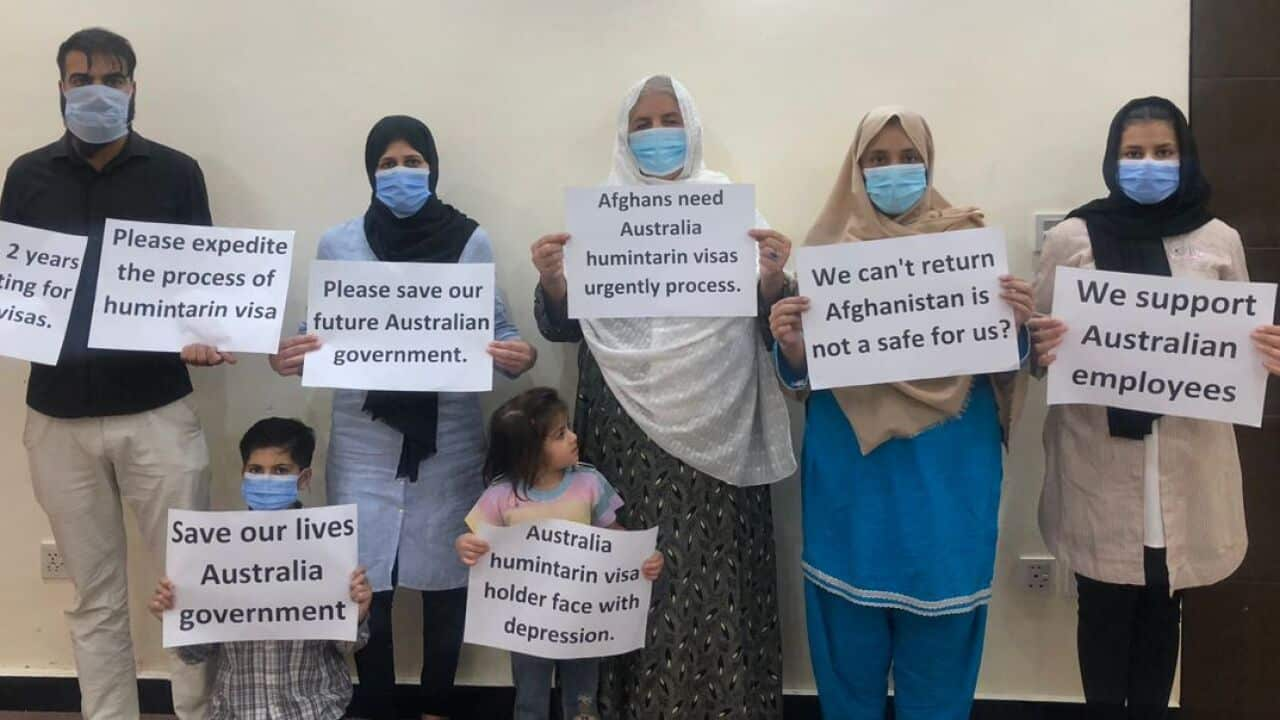Key Points
- Three Hazara former refugees are representing Australia at this year's UNHCR Global Refugee Forum.
- The forum brings together governments and NGOs from around the world to tackle the global refugee crisis.
- Advocates say Australia has the capacity to play a bigger role in solving the growing crisis.
The federal government on Monday pledged to after an .
While the move - which comes following the release of the government's long-awaited migration strategy - won't directly affect the country's humanitarian intake, three former refugees are calling on countries like Australia to do more to kerb the world's growing refugee crisis.
As a Hazara, Zaki Haidari said he felt voiceless in Afghanistan.

Zaki Haidari is one of about 15 people who are there to represent Australia’s refugee advocacy network. Credit: Supplied
In that year, he arrived in Australia by boat, though witnessing the "unfavourable" treatment endured by thousands of other asylum seekers and refugees at the hands of the federal government, he decided to take action.
“I decided to become a voice for them … so that I can raise awareness about (questions such as) who is a refugee? Who is an asylum seeker? What’s happening in Afghanistan? Why we left our country to come to a country where we at least can be human and have our rights as human beings?” he told SBS Dari.
Mr Haidari was one of more than 30,000 refugees and asylum seekers referred to as the ‘Legacy Caseload’ who arrived in Australia by boat before 1 January 2014 and were permitted to remain.
In February 2023, the government announced that it would fulfil an election commitment and move some 19,000 Temporary Protection visa (TPV) and Safe Haven Enterprise visa (SHEV) holders onto permanent visas.
After years of living in uncertainty, Mr Haidari finally received his permanent residency in September.
Eleven years after first stepping foot on Australian soil, Mr Haidari is now a strong voice, advocating for his fellow refugees on an international stage.
He is representing Amnesty International Australia at the forum.
He is one of a delegation of 15 people representing Australia’s refugee advocacy network, a group that includes three Hazaras..
Held every four years, the three-day forum brings together governments and NGOs from around the globe to discuss the growing refugee crisis fuelled by war and unrest.
The forum allows them to make new pledges, share their good practices, and “inspire further burden- and responsibility-sharing”.
I went through a very difficult path and a very harsh life to be where I am today.Zaki Haidari
“From Australia, a very strong team [of advocates] is going to the forum … We’re pleased to be able to be a voice and accompany the Australian government and demand on the world stage that it needs to make a meaningful commitment for the next four years.
“When we say a 'meaningful commitment', it does not mean that they just make a pledge and then come back to the country ... When they say that they will do this in the next four years, they should do it.”
Hazara entrepreneur Hedayat Osyan is also among the Australian contingent at the forum.

Hedayat Osyan runs CommUnity Construction, a social enterprise that employs about 80 refugees. Credit: Supplied/Zaki Haidari
After finishing his honours degree at the University of Canberra in 2016, Mr Osyan received an offer to complete his PhD at the same university.
But he said he had decided to put his lifelong dream of completing his PhD on hold after seeing a “shocking” number of his fellow refugees struggling to find work.
So, he started a social enterprise where he hired and trained dozens of refugees like himself.
“It was one of my dreams to be able to participate in this forum because it's one of the biggest get-togethers about refugees in the world,” he said.
“I am one of the lucky ones who participated in this forum this year and represent some of the refugees who have no voice or representation at the international level.
“My aim is to share the suffering and struggles that Afghan refugees face across the globe, particularly in Iran, Pakistan and Indonesia, at the forum and demand help for them.”

Najeeba Wazefadost is the founder and president of Hazara Women of Australia. Credit: Facebook/HWA
She fled Afghanistan with her parents at the age of 10, seeking asylum from Australia by boat in September 2000.
She spent several months in immigration detention before being recognised as a refugee, and went on to win a national essay-writing competition at the age of 14.
She is the founder and president of Hazara Women of Australia, which helps newly arrived refugee women learn English.
Australia should play a ‘leadership’ role
Mr Osyan believes that Australia could play a key role in addressing the world’s refugee crisis.
He said he was particularly concerned about the plight of people fleeing his homeland and believed every crisis in Afghanistan got overshadowed by other crises around the world.
“For example, when Afghanistan fell in 2021, the Ukraine conflict broke out after a few months, and, because of this, Afghanistan's crisis was largely overshadowed. Currently, when Pakistan and Iran started deporting Afghan refugees, the Hamas and Israel conflict came along,” he said.
“Afghan refugees are the most vulnerable refugees in the world.
“Inside Afghanistan, we are at the mercy of a group from where people can’t get their message out to the international community, and those who manage to get out of Afghanistan and seek refuge in the neighbouring countries, they face grave danger - they’re at risk of torture, arrest and deportation to Afghanistan where they’ve no safety whatsoever.”
He said he had made it his mission to share this situation with the world and ask countries to take the Afghanistan issue seriously and prioritise the most vulnerable.
Mr Haidari echoed his concerns and said Australia had the capacity and ability to play a leadership role in responding to the growing refugee crisis.
“At this forum, our demand from the Australian government is (for it to) increase its intake so we can better respond to the current global crisis,” he said.
“Australia can be a key country in offering protection to these refugees and show leadership to the rest of the world so that other countries also respond to the crisis. For example, Japan and Malaysia are among (other) countries in the region that can put forward a meaningful response.
“Canada has pledged to accept 50,000 refugees every year, (and) we believe that Australia has the same capacity or ability to at least accept 40,000 people if it cannot accept 50,000 refugees.”

The Global Refugee Forum 2023 takes place from 13 to 15 December in Geneva, Switzerland.
The Albanese government to 27,000 people per year.
According to the UN’s refugee agency, there are currently more than 110 million forcibly displaced people globally and 36.4 million refugees.
Over half (52 per cent) of the world’s refugees originate from three countries: Syria (6.5 million), Afghanistan (6.1 million) and Ukraine (5.9 million).





